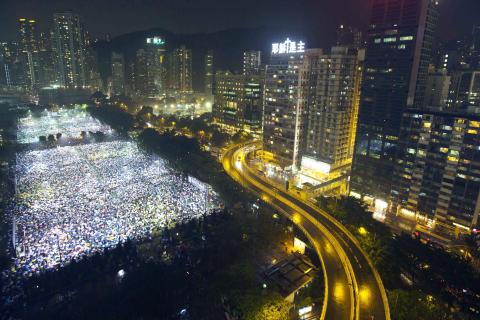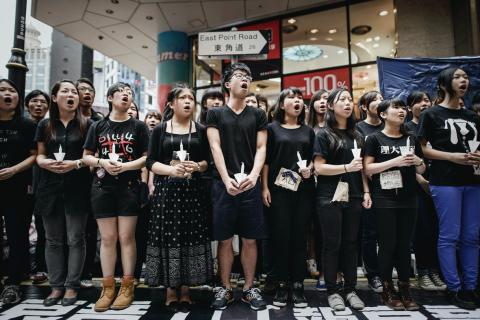Tens of thousands of Hong Kongers braved thunder and a torrential downpour to attend a candlelight vigil yesterday marking the 24th anniversary of China’s bloody Tiananmen crackdown, as Beijing blocked commemoration attempts.
A massive turnout filled the former British colony’s Victoria Park in an annual act of remembrance for the hundreds, perhaps thousands, of people killed in the June 4 and 5 onslaught in Beijing in 1989.
In Beijing, police blocked the gate of a cemetery housing victims of the crackdown on pro-democracy demonstrators as part of a sweeping annual effort to bar commemorations.

Photo: Reuters
In a narrow street near Beijing’s Forbidden City, security personnel patrolled outside the former house of Zhao Ziyang (趙紫陽), the former Chinese Communist Party secretary who was purged and held under house arrest for perceived sympathy with the protesters.
Chinese authorities also blocked online searches for a wide range of keywords ranging from “Tiananmen” to “candle” on Sina Weibo (新浪微博), China’s version of Twitter.
Hong Kong and Macau, which reverted to Beijing’s rule in the late 1990s but have semi-autonomous status, are the only places in China where the brutal military intervention is openly marked.

Photo: AFP
The event has largely been expunged from official Chinese history, but Victoria Park was transformed yesterday into a sea of demonstrators holding candles.
“Vindicate June Fourth,” protesters shouted. “We will never forget.”
“The candlelight vigil tonight has an additional meaning of not just condemning the massacre 24 years ago, but also condemning the suppression today [in China],” said Lee Cheuk-yan (李卓人), chairman of protest organizers the Hong Kong Alliance in Support of Patriotic Democratic Movements of China.
Billy Li, a 28-year-old recent university graduate, said he was attending because the Tiananmen crackdown “has not been vindicated, because the truth has not been told.”
Organizers had said they expect 150,000 people to attend the event, including an increasing number of mainland Chinese. No estimate of the crowd size was immediately available.
“I hope the next generation will not have to suffer the red terror,” 42-year-old Pan Xidian from the Chinese city of Xiamen said.
“We have not given up,” the construction worker said, adding that it he was very thankful for Hong Kongers’ support.
Pan had traveled to Hong Kong for the first time to commemorate the crackdown that ended weeks of nationwide democracy protests.
Beijing has never provided an official final toll for the military repression, which was condemned worldwide. Independent observers tallied more than 1,000 dead in Beijing, without including victims elsewhere.
“I think all of us, even the new generation in Hong Kong, would have the same feeling that it is a tragedy and also an offense by the government to shoot people like that,” said Richard Choi, vice chairman of the organizing group.
“The problem is still not resolved, that’s why Hong Kong people have the same feelings and the same demands as they did 24 years ago,” he said.
The Chinese Communist Party branded the Tiananmen protests a “counterrevolutionary rebellion,” and each year Beijing pushes to prevent commemorations.
However, pro-democracy advocates in Hong Kong have marked the event every year. Organizers said 180,000 people took part last year, while police put the figure at 85,000.

INVESTIGATION: The case is the latest instance of a DPP figure being implicated in an espionage network accused of allegedly leaking information to Chinese intelligence Democratic Progressive Party (DPP) member Ho Jen-chieh (何仁傑) was detained and held incommunicado yesterday on suspicion of spying for China during his tenure as assistant to then-minister of foreign affairs Joseph Wu (吳釗燮). The Taipei District Prosecutors’ Office said Ho was implicated during its investigation into alleged spying activities by former Presidential Office consultant Wu Shang-yu (吳尚雨). Prosecutors said there is reason to believe Ho breached the National Security Act (國家安全法) by leaking classified Ministry of Foreign Affairs information to Chinese intelligence. Following interrogation, prosecutors petitioned the Taipei District Court to detain Ho, citing concerns over potential collusion or tampering of evidence. The

Seventy percent of middle and elementary schools now conduct English classes entirely in English, the Ministry of Education said, as it encourages schools nationwide to adopt this practice Minister of Education (MOE) Cheng Ying-yao (鄭英耀) is scheduled to present a report on the government’s bilingual education policy to the Legislative Yuan’s Education and Culture Committee today. The report would outline strategies aimed at expanding access to education, reducing regional disparities and improving talent cultivation. Implementation of bilingual education policies has varied across local governments, occasionally drawing public criticism. For example, some schools have required teachers of non-English subjects to pass English proficiency

‘FORM OF PROTEST’: The German Institute Taipei said it was ‘shocked’ to see Nazi symbolism used in connection with political aims as it condemned the incident Sung Chien-liang (宋建樑), who led efforts to recall Democratic Progressive Party (DPP) Legislator Lee Kun-cheng (李坤城), was released on bail of NT$80,000 yesterday amid an outcry over a Nazi armband he wore to questioning the night before. Sung arrived at the New Taipei City District Prosecutors’ Office for questioning in a recall petition forgery case on Tuesday night wearing a red armband bearing a swastika, carrying a copy of Adolf Hitler’s Mein Kampf and giving a Nazi salute. Sung left the building at 1:15am without the armband and apparently covering the book with a coat. This is a serious international scandal and Chinese

NEGOTIATIONS: The US response to the countermeasures and plans Taiwan presented has been positive, including boosting procurement and investment, the president said Taiwan is included in the first group for trade negotiations with the US, President William Lai (賴清德) said yesterday, as he seeks to shield Taiwanese exporters from a 32 percent tariff. In Washington, US Trade Representative Jamieson Greer said in an interview on Fox News on Thursday that he would speak to his Taiwanese and Israeli counterparts yesterday about tariffs after holding a long discussion with the Vietnamese earlier. US President Donald Trump on Wednesday postponed punishing levies on multiple trade partners, including Taiwan, for three months after trillions of US dollars were wiped off global markets. He has maintained a 10 percent